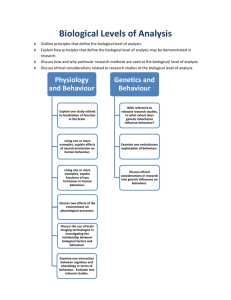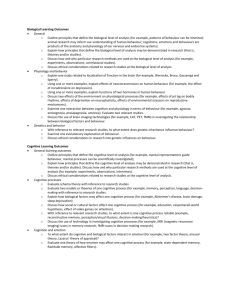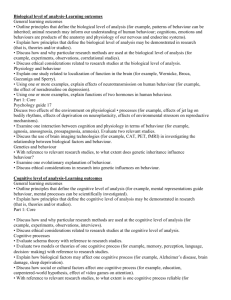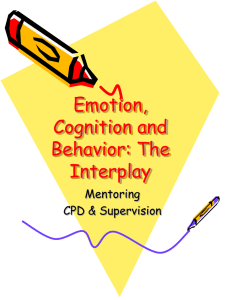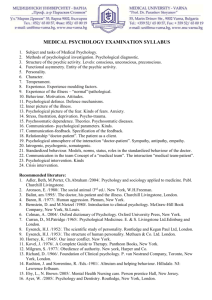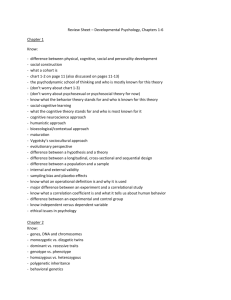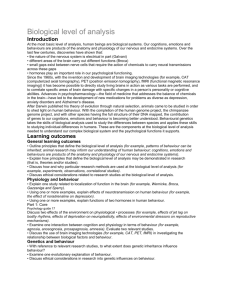IB Psychology Learning Outcomes & Assessment Objectives
advertisement
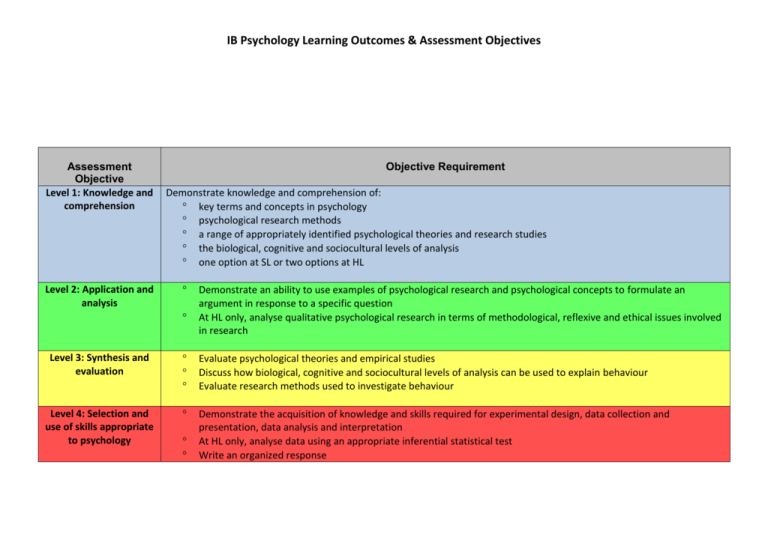
IB Psychology Learning Outcomes & Assessment Objectives Assessment Objective Level 1: Knowledge and comprehension Level 2: Application and analysis Objective Requirement Demonstrate knowledge and comprehension of: key terms and concepts in psychology psychological research methods a range of appropriately identified psychological theories and research studies the biological, cognitive and sociocultural levels of analysis one option at SL or two options at HL Demonstrate an ability to use examples of psychological research and psychological concepts to formulate an argument in response to a specific question At HL only, analyse qualitative psychological research in terms of methodological, reflexive and ethical issues involved in research Level 3: Synthesis and evaluation Evaluate psychological theories and empirical studies Discuss how biological, cognitive and sociocultural levels of analysis can be used to explain behaviour Evaluate research methods used to investigate behaviour Level 4: Selection and use of skills appropriate to psychology Demonstrate the acquisition of knowledge and skills required for experimental design, data collection and presentation, data analysis and interpretation At HL only, analyse data using an appropriate inferential statistical test Write an organized response IB Psychology Learning Outcomes & Assessment Objectives Learning Outcomes of Biological Level of Analysis General Learning Outcomes Physiology and behaviour Genetics and behaviour Outline principles that define the biological level of analysis Explain how principles that define the biological level of analysis may be demonstrated in research Discuss how and why particular research methods are used at the biological level of analysis Discuss ethical considerations related to research studies at the biological level of analysis. Explain one study related to localization of function in the brain Using one or more examples, explain effects of neurotransmission on human behaviour Using one or more examples, explain functions of two hormones in human behaviour. Discuss two effects of the environment on physiological processes Examine one interaction between cognition and physiology in terms of behaviour. Evaluate two relevant studies. Discuss the use of brain imaging technologies in investigating the relationship between biological factors and behaviour. With reference to relevant research studies, to what extent does genetic inheritance influence behaviour? Examine one evolutionary explanation of behaviour. Discuss ethical considerations in research into genetic influences on behaviour. Learning Outcomes of Cognitive Level of Analysis General Learning Outcomes Cognitive Processes Cognition and Emotion Outline principles that define the cognitive level of analysis Explain how principles that define the cognitive level of analysis may be demonstrated in research (that is theories and/or studies) Discuss how and why particular research methods are used at the cognitive level of analysis Discuss ethical considerations related to research studies at the cognitive level of analysis. Evaluate schema theory with reference to research studies. Evaluate two models or theories of one cognitive process (for example, memory, perception, language, decision‑making) with reference to research studies. Explain how biological factors may affect one cognitive process Discuss how social or cultural factors affect one cognitive process With reference to relevant research studies, to what extent is one cognitive process reliable Discuss the use of technology in investigating cognitive processes To what extent do cognitive and biological factors interact in emotion Evaluate one theory of how emotion may affect one cognitive process Assessment Objective Level 1: Knowledge and comprehension Level 2: Application and analysis Level 3: Synthesis and evaluation Level 4: Selection and use of skills appropriate to psychology IB Psychology Learning Outcomes & Assessment Objectives Learning Outcomes of Sociocultural Level of Analysis General Learning Outcomes Sociocultural Cognition Social Norms Cultural Norms Outline principles that define the sociocultural level of analysis Explain how principles that define the sociocultural level of analysis may be demonstrated in research (that is, theories and/or studies). Discuss how and why particular research methods are used at the sociocultural level of analysis Discuss ethical considerations related to research studies at the sociocultural level of analysis. Describe the role of situational and dispositional factors in explaining behaviour. Discuss two errors in attributions Explain the formation of stereotypes and their effect on behaviour. Describe the role of situational and dispositional factors in explaining behaviour. Explain social learning theory, making reference to two relevant studies. Discuss the use of compliance techniques (for example, lowballing, foot‑in‑the‑door, reciprocity). Evaluate research on conformity to group norms. Discuss factors influencing conformity Define the terms “culture” and “cultural norms”. Examine the role of two cultural dimensions on behaviour Using one or more examples, explain “emic” and “etic” concepts. Learning Outcomes of Abnormal Psychology General Framework Concepts and Diagnosis Psychological Disorders Implementing Treatment To what extent do biological, cognitive and sociocultural factors influence abnormal behaviour? Evaluate psychological research (that is, theories and/or studies) relevant to the study of abnormal behaviour. Examine the concepts of normality and abnormality. Discuss validity and reliability of diagnosis. Discuss cultural and ethical considerations in diagnosis Describe symptoms and prevalence of one disorder from two of the following groups: o anxiety disorders o affective disorders o eating disorders. Analyse etiologies (in terms of biological, cognitive and/or sociocultural factors) of one disorder from two of the following groups: o anxiety disorders o affective disorders o eating disorders Discuss cultural and gender variations in prevalence of disorders. Examine biomedical, individual and group approaches to treatment. Evaluate the use of biomedical, individual and group approaches to the treatment of one disorder. Discuss the use of eclectic approaches to treatment. Discuss the relationship between etiology and therapeutic approach in relation to one disorder. Assessment Objective Level 1: Knowledge and comprehension Level 2: Application and analysis Level 3: Synthesis and evaluation Level 4: Selection and use of skills appropriate to psychology IB Psychology Learning Outcomes & Assessment Objectives Learning Outcomes of Psychology of Human Relationships General Framework Social Responsibility Interpersonal Relationships Violence To what extent do biological, cognitive and sociocultural factors influence human relationships? Evaluate psychological research (that is, theories and/or studies) relevant to the study of human Distinguish between altruism and prosocial behaviour. Contrast two theories explaining altruism in humans. Using one or more research studies, explain cross‑cultural differences in prosocial behaviour. Examine factors influencing bystanderism. Examine biological, psychological and social origins of attraction. Discuss the role of communication in maintaining relationships. Explain the role that culture plays in the formation and maintenance of relationships. Analyse why relationships may change or end. Evaluate sociocultural explanations of the origins of violence. Discuss the relative effectiveness of two strategies for reducing violence. Discuss the effects of short‑term and long‑term exposure to violence Learning Outcomes of Qualitative Research Methods General Framework Distinguish between qualitative and quantitative data. Explain strengths and limitations of a qualitative approach to research. To what extent can findings be generalized from qualitative studies? Discuss ethical considerations in qualitative research. Discuss sampling techniques appropriate to qualitative research Explain effects of participant expectations and researcher bias in qualitative research. Explain the importance of credibility in qualitative research. Interviews Explain the effect of triangulation on the credibility/trustworthiness of qualitative research. Explain reflexivity in qualitative research. Evaluate semi‑structured, focus group and narrative interviews. Discuss considerations involved before, during and after an interview Explain how researchers use inductive content analysis (thematic analysis) on interview transcripts. Observations Evaluate participant, non‑participant, naturalistic, overt and covert observations. Discuss considerations involved in setting up and carrying out an observation Discuss how researchers analyse data obtained in observational research. Case Studies Evaluate the use of case studies in research. Explain how a case study could be used to investigate a problem in an organization or group Discuss the extent to which findings can be generalized from a single case study. Assessment Objective Level 1: Knowledge and comprehension Level 2: Application and analysis Level 3: Synthesis and evaluation Level 4: Selection and use of skills appropriate to psychology IB Psychology Learning Outcomes & Assessment Objectives Learning Outcomes of Experimental Research Experimental Design Sampling Procedures Evaluation of Research Define the aim of a study. State a research and null hypothesis of a study (HL only). State the independent and dependent variable in an experiment. State operational definitions of variables. Describe potential confounding variables. Explain the controls needed for an experiment (for example, maturation, contamination, placebo Explain effects of participant and researcher expectations and bias Discuss the strengths and limitations of experimental designs (for example, independent samples, repeated measures etc) Explain the use of single- and double‑blind techniques. Discuss sampling techniques appropriate to quantitative research (for example, random, opportunity, systematic, stratified). Explain the concept of representative sampling. Discuss how participants are allocated to experimental and control groups (for example, matched pairs) Discuss the concepts of internal and external validity. Discuss conditions that increase a study’s reliability. Apply descriptive statistics to analyse data (for example, mean, median, mode, range, standard deviation). Distinguish between levels of measurement (including nominal, ordinal, interval, ratio). Apply appropriate graphing techniques to represent data (for example, bar chart, histogram, line graph, frequency polygon). Apply an appropriately chosen statistical test in order to determine the level of significance of data (HL only) Assessment Objective Level 1: Knowledge and comprehension Level 2: Application and analysis Level 3: Synthesis and evaluation Level 4: Selection and use of skills appropriate to psychology

